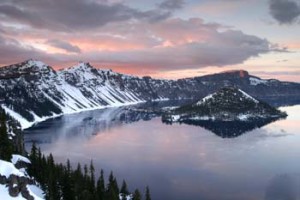Crater Lake Wilderness: Oregon’s ‘best idea’ needs protection
Oregonian
Portland, Oregon
October 17, 2009
By Steve Pedery and Robert Mutch
During the first week of October, the nation was captivated by Ken Burns’ most recent examination of American history and culture. His series, “The National Parks: America’s Best Idea,” is a powerful chronicle of our unique national legacy of protecting our most precious landscapes, and a call to future generations to carry on this work.
|
|
Here in Oregon, we have only one national park — and it is known the world over. Crater Lake is an Oregon icon. It is the deepest lake in North America and one of the purest bodies of water on Earth. Crater Lake and its surrounding wildlands provide the postcard image that encapsulates Oregon’s beauty and commitment to conservation.
Sadly, it is threatened.
A helicopter tour operator is seeking a permit for flights into the park, over its backcountry, and along the crater rim. The noise pollution from these flights would destroy the quiet of the park, disrupt wildlife, and greatly diminish the experience of the vast majority of park visitors. Anyone who has walked the Rim Trail knows that the pristine air quality and quiet solitude in the park is a rare treat in an increasingly busy world.
Helicopter flights could also threaten the pristine waters of Crater Lake. Though helicopter accidents are thankfully rare, they do occur. In 1995, a helicopter crashed into the lake, killing both passengers and releasing 70 gallons of jet fuel into its waters.
The proposal for noisy helicopter flights is not the only threat to the wildlands surrounding Crater Lake. A misguided Forest Service logging project, known as D-Bug, proposes to log thousands of acres of forestland just north of the park boundary. This reckless proposal includes the logging of several thousand acres of potential wilderness accompanied by 25 miles of new logging roads. It would also convert 8 miles of hiking trails into logging roads.
Put simply, we need to do a better job of protecting our natural treasures in Oregon. Our state has only one national park and only 4 percent of the state is protected as wilderness.
The solution to stopping the misguided logging of the D-Bug project and the threat of noisy helicopter flights over the park is wilderness protection. Wilderness designation is the gold standard for safeguarding our public lands, and conservationists and the National Park Service have long argued that Crater Lake and its surrounding wildlands deserve wilderness status. This would protect amazing scenic vistas, wildlife habitat, and the headwaters of the famous Rogue and Umpqua Rivers outside the park. Existing access to Crater Lake, the rim drive, and the lodge would be fully maintained.
Ken Burns dubbed his newest series “America’s Best Idea.” It’s worth remembering that it took countless elected leaders and impassioned citizens fighting against long odds to make this idea a reality. The Florida Everglades were saved from rampant development. The Olympics from a binge of clear-cut logging. The foothills of the Grand Tetons were saved for the entire nation against the wishes of the provincial interests of the state of Wyoming.
Of course, today the Tetons are proudly stamped on the Wyoming license plate, just as Oregon pays tribute to our only national park with our own commemorative license plates. But we all know that is not enough. The responsibility of Oregonians today is to ensure that the natural wonder of Crater Lake lives on for future generations to enjoy. Our best idea cannot be preserved on the bumpers of our cars, we must actively fight to protect this unique American legacy.
Steve Pedery is conservation director of Oregon Wild. Robert Mutch is executive director of the Crater Lake Institute.
***previous*** — ***next***


